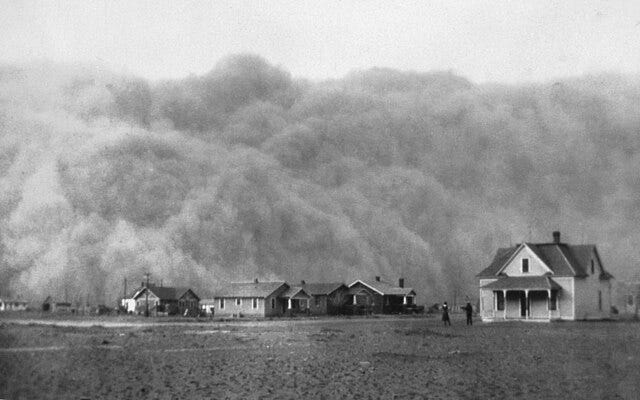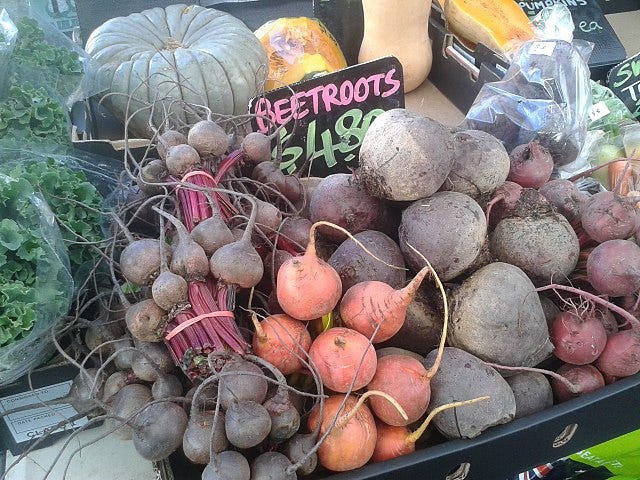Hi all,
Thank you for joining me for today’s song, “Pastures of Plenty”, by Woody Guthrie. If you’d like to hear the song before you read about it, I’ve included a YouTube video below the article. For Japanese students, vocabulary words in bold are provided in Japanese below. TOEIC (PBT) 450+, Eiken 2, CEFR B1.
Did you know you can listen to each article of “Social Issues in Song” on the Substack App? Download the app here:
(657 words)
Woody Guthrie was a storyteller, a songwriter, and a musician who used his songs to share stories about American life.
Guthrie was born in Oklahoma in 1912. He grew up on a farm during a time when life was very hard. He started playing guitar at a young age and used his music to express his feelings about the hardships he and his family faced.
Woody Guthrie was a very talented songwriter, and he wrote songs about many different topics, including social justice and labor unions. He often traveled around the country, playing his guitar and singing his songs. He met many interesting people along the way, and he learned a lot about the different experiences of people living in America.
The Great Depression was a very difficult time in American history. The stock market crashed in 1929, and millions of people lost their jobs. Businesses closed, and banks failed. Many families couldn't afford food or shelter.
The Dust Bowl was a period of severe dust storms that blew across the Great Plains. The dust storms damaged crops and forced many farmers to leave their homes. Entire families travelled to California and Oregon to look for work. They had to travel through deserts and over high mountains to get there.
Pastures of Plenty is a song about the experiences of those workers.
It's a mighty hard row that my poor hands have hoed
My poor feet have traveled a hot dusty road
Out of your Dust Bowl and westward we rolled
And your deserts were hot and your mountains were cold
Many of Woody Guthrie’s songs tell about how hard life was for farmers. Sometimes they only had work for one day or maybe a week. Families had to sleep in their cars or trucks or maybe along the side of the road. They went anywhere they could find work.
I worked in your orchards of peaches and prunes
I slept on the ground in the light of the moon
On the edge of the city you'll see us and then
We come with the dust and we go with the wind
California, Arizona, I harvest your crops
Well, it's north up to Oregon to gather your hops
Dig the beets from your ground, cut the grapes from your vine
To set on your table your light sparkling wine
In 1941, a power company wanted to build dams along the Columbia River. Guthrie was offered a job to write and perform songs about the dams. Woody saw this as a wonderful opportunity for the farmers to get electricity to pump water to their farms. At that time, the people building the dams (and Woody, of course) didn’t know - or didn’t want to know - about the damage that dams cause to the environment. The indigenous people living in the area understood, but they didn’t have enough power to fight the construction of dams. The dams were built, and the environment was greatly changed.
Green pastures of plenty from dry desert ground
From the Grand Coulee Dam where the waters run down
Every state in the Union us migrants have been
We'll work in this fight and we'll fight till we win
The song also expresses hope for the future. Guthrie sings about a time when people will be able to live in peace and prosperity. He imagines a land where there is plenty of food and water, and where everyone has a chance to succeed.
It's always we rambled, that river and I
All along your green valley, I will work till I die
My land I'll defend with my life if it be
‘Cause my pastures of plenty must always be free
Woody Guthrie was a powerful voice for the people. He used his music to raise awareness about social injustice and to inspire people to fight for a better future. "Pastures of Plenty" is just one example of his many contributions to American music and culture.
Question:
How have migrant workers contributed to your society?
Vocabulary
hardship 苦難
social justice 社会正義
stock market 株式市場
shelter 避難所
dust storm 砂嵐
pasture 牧草地
plenty 豊富
hoe 鋤く
dusty 砂っぽい
westward 西へ
orchard 果樹園
indigenous 先住民
construction 建設
migrant 移住労働者
ramble 散歩
defend 守る
Source:
Klein, J. (1980). Woody Guthrie: A life. Ballantine Books.
Pastures of Plenty: Woody Guthrie and the Columbia River dams at https://orionmagazine.org/article/pastures-of-plenty/. This article talks about Woody Guthrie writing songs promoting the dams during a government-funded trip. The article leaves you wondering about the trade-offs between progress and environmental protection.











I live in a relatively poor area of France, we weren't aware of this when we bought the house, put that down to excitement of having found the house of our dreams and not bothering to research further the practicalities! I only spoke schoolgirl French when we arrived and couldn't understand why so many of the locals had an accent that made their French even harder to understand.
Eventually, once the excitement had fled and the harsh reality of having bought a derelict house in the middle of nowhere had sunk in, I realised that our local town, indeed the whole 'Bassin' as its known as, (four small towns sit in a flat extended valley bottom) had been one of Frances most important mining communities.The mines (coal) created thousands of jobs and immigrants flocked from Southern Europe (mainly Portugal) with their families in search of work. This happened primarily at the turn of the last century through the the 1960's when the mines were closed but many of the descendants are still living there. When the mines closed, due to no longer being cost efficient (cheaper coal was being imported for Eastern Europe) they lost there jobs, many left in search of work elsewhere, the population of the small commune and town we are attached to dwindled from 40K at its height to a mere 3.5K, the commune had no fall back, if you walk the streets today, they are slowly recovering but the poverty is still very evident. The entire Bassin never really recovered...
For almost 100 years though, the immigrant population helped keep what would have been a poor and dwindling farming community alive and for a short while wealthy because with the influx of population more food was needed too, and more wine! That's another story though..
The Depression Era was before my entrance into the world however, as a child was always reminded that “I had been born with a silver spoon in my mouth.” We have not witnessed another Depression Era but that is not to say that during certain periods in our history and culture racism, greed, and inequality have been the cause of social,economic, and extinction/extermination depression has been evident. I continue to have images of Life Magazine photos of the people found in the German Concentration Camps and also a book on the Tennessee Valley Authority, an FDR New Deal Program which displaced a very poor population composed of both black and white families that had recovered from Civil War poverty status. The photos in the book depicted very undernourished adults and children. I can’t remember the correspondent who wrote, photographed, and published the book but would like to read it again with an older mind. I remember it was said that President Eisenhower had called the TVA a socialist program.
Getting back to the role immigrants have played in my life-we all are immigrants in this country not counting the American Indian(although a
theory has attributed their migration from China). There is a difference between Yesterday’s immigrant from today’s immigrant. Yesterday they came to settle a new country for several personal reasons-today’s immigrant is coming for a lot of the same reasons but the status quo is not welcoming them and they are mostly used for labor until they are able to rise above that station. Today’s immigrant is providing food and services that are at the bottom of the scale however, without their work most of this country’s population would have to do without.